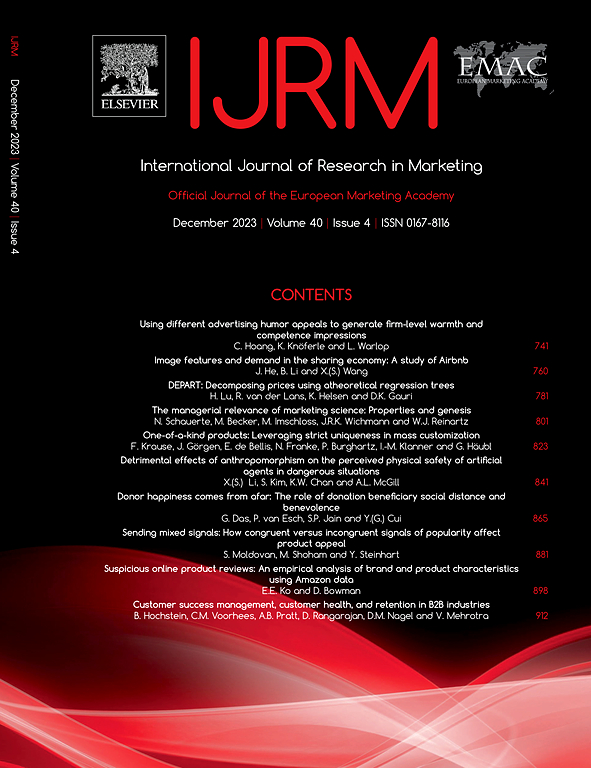Balancing exclusivity and inclusivity through the strategic domestication of the luxury retail experience
IF 7.5
2区 管理学
Q1 BUSINESS
International Journal of Research in Marketing
Pub Date : 2025-03-01
DOI:10.1016/j.ijresmar.2024.05.001
引用次数: 0
Abstract
The mass-marketization of the luxury field results in a conundrum for brands: how to sell to the new mass of luxury consumers while continuing to conform to expectations of a singular, exclusive, and elitist experience. In contrast with prior research, which primarily focuses on understanding how luxury brands maintain their exclusivity despite market pressures toward “mass-marketization”, we draw on the institutional logics framework to explore how luxury mobilizes domestic elements in the service encounter to manage inclusivity and exclusivity imperatives in a context of massification. We show that the strategic mobilization of the domestic logic and its articulation with the market logic enable luxury brands to balance these contradictory imperatives. We identify three strategies that brands deploy in their retail stores: disguise (camouflaging the market logic under layers of domesticity), hybridization (blending domestic and market logics), and juxtaposition (partitioning domestic and market logics). Our findings suggest that domesticity can be mobilized both as an integration and a separation mechanism and that the “domestication” of the luxury retail experience enables brands to situate their customers at different levels of the consumption experience. Building on these findings, we give brands and operational managers working in luxury firms several avenues for improving the way they manage customer experience and service encounters.
通过对奢侈品零售体验进行战略性本土化,平衡专属性和包容性
奢侈品领域的大规模市场化给品牌带来了一个难题:如何向新的奢侈品消费者群体销售产品,同时继续符合他们对独特、独家和精英体验的期望。先前的研究主要关注奢侈品品牌如何在市场压力下保持其排他性,而我们利用制度逻辑框架来探讨奢侈品如何在服务遭遇中调动国内元素,以在大众化背景下管理包容性和排他性。我们表明,国内逻辑的战略动员及其与市场逻辑的衔接使奢侈品牌能够平衡这些矛盾的必要性。我们确定了品牌在其零售商店中采用的三种策略:伪装(在家庭生活层下伪装市场逻辑),杂交(混合国内和市场逻辑)和并置(划分国内和市场逻辑)。我们的研究结果表明,家属化既可以作为一种整合机制,也可以作为一种分离机制,奢侈品零售体验的“家属化”使品牌能够将客户置于不同的消费体验层次。在这些发现的基础上,我们为在奢侈品公司工作的品牌和运营经理提供了几种改进他们管理客户体验和服务的方法。
本文章由计算机程序翻译,如有差异,请以英文原文为准。
求助全文
约1分钟内获得全文
求助全文
来源期刊
CiteScore
11.80
自引率
4.30%
发文量
77
审稿时长
66 days
期刊介绍:
The International Journal of Research in Marketing is an international, double-blind peer-reviewed journal for marketing academics and practitioners. Building on a great tradition of global marketing scholarship, IJRM aims to contribute substantially to the field of marketing research by providing a high-quality medium for the dissemination of new marketing knowledge and methods. Among IJRM targeted audience are marketing scholars, practitioners (e.g., marketing research and consulting professionals) and other interested groups and individuals.

 求助内容:
求助内容: 应助结果提醒方式:
应助结果提醒方式:


